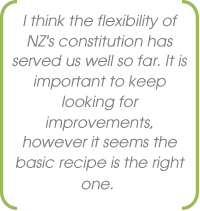

Maria English
Maria English is a second year Politics, Psychology and Sociology student at Cambridge University, England. She is studying on a Girdler’s Scholarship for NZ undergraduates and hopes to return home to Wellington after completing her degree.
Question 1: What three issues facing youth today do you feel particularly strongly about?
A biggie is education. There’s a great, often very lively debate going on over how the system should work, and amidst that debate, I think two things are important to keep sight of: first, learning can take diverse forms, so though formal state institutions are key they are not the whole picture and the traditional education path doesn’t suit everyone. Second, we can’t afford to give up on the people who seem to ‘fall through the gaps’. An example that springs to mind is teen parents: letting them drop off the education radar has massive adverse consequences not only for the futures of those young parents but also for their children.
Another issue I feel strongly about is youth suicide, because it is so destructive to young people and their communities. Severe depression affects a surprisingly high amount of young people, 1 out of 7. With help and support, most people do get through it, so there’s a lot of hope to take from that.
Third, I think young people also need to have an eye to the future and be ready for the change that is going to come over the next few decades. Some changes will be local; we’ll have to figure out how to support an ageing population, and face the challenges of increasing multiculturalism in addition to trying to set Maori-Pakeha relations on a solid foundation. Some changes will be more global; the often noted example is the ‘rise of China’ as a key economic and political player, especially in the Asia-Pacific region. We aren’t in a position to predict or control a lot of these changes, but what we can do is develop our collective resilience so that as new problems arise we can tackle them and don’t become victims of fate, or of history.
Question 2: What changes would you like to make to the way New Zealand is governed?
I think we have a pretty healthy system of governance: there is minimal corruption, a free and active media, Parliament is relatively stable and people are free to participate through a variety of formal and informal avenues. I think the flexibility of NZ’s constitution has served us well so far. It is important to keep looking for improvements, however it seems the basic recipe is the right one.
Question 3: What actions, if any, are you planning to contribute to the constitutional review?
I want to try and learn as much as possible about the issues so that if an opportunity arises in future to formally participate, for example through a referendum, I will be able to make an informed contribution.

